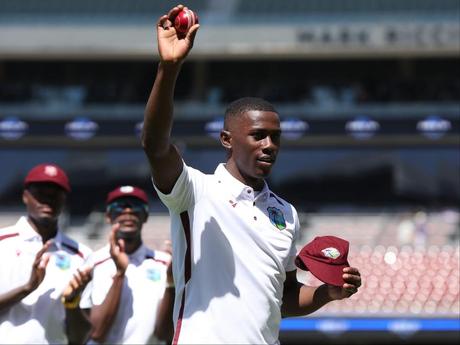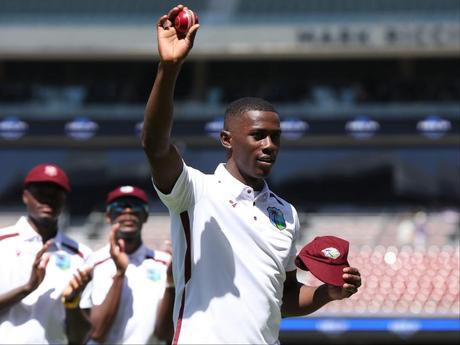Last month, Shamar Joseph received a phone call that changed his life. You've probably heard the story of the Guyanese boy who left a life of logging and security to pursue his cricketing dream. January saw the fulfillment of a very fanciful fantasy as Joseph ripped through an Australian batting line-up of some repute to secure the West Indian victory in Brisbane for the first time since 1997.
The Baracara boy had ended up well. And yet it says a lot about the modern cricketing landscape that former seamer Ian Bishop worried in the moments after seeing the West Indies unearth another fast bowling gem. Worried that the Windies would soon lose his rare talents, and also concerned for Joseph, with the wealth and hardships that awaited him.
"[It is] It is important for the board, the Guyanese government and cooperating agencies to find a way to allocate funds to compensate Shamar Joseph and one or two other fast bowlers so that they can remain in the Caribbean and control how much cricket they play," Bishop wrote on X. pace is everything. Don't allow burnout."
Bishop knew what was coming: in February, Mark Wood was withdrawn from his contract with the Lucknow Super Giants in the Indian Premier League (IPL), leaving them scrambling for a replacement in a hurry. Joseph, whose international career was less than a month old, was identified and recruited. In a seam attack that is not an established international option, the 24-year-old's third professional T20 appearance is likely to be Lucknow's opener against the Rajasthan Royals on Sunday.
Offers elsewhere to follow. Joseph's sheer pace, as Bishop noted, will make him a very valuable asset. If you're so inclined, you could plot a year-long course in franchise cricket, starting in Australia with the Big Bash in January, then moving on to the SA20 or ILT20, to the PSL and IPL and on to The Hundred or Major League Cricket. Reports suggest the IPL is in negotiations with the Saudi Public Investment Fund (PIF) - yes, them - over an autumn release of their commercial behemoth. Welcome to the T20 treadmill, Shamar - good luck getting off.
The story continues
Picking and choosing the leagues one plays in are the most important decisions the modern cricketer has to make. There is increasing pressure from IPL franchises to play for their sister teams in other leagues around the world - a Kolkata Knight Riders player could play in four different leagues by 2024, all with a single badge on their chest.
The independent knows a leading cricketer who turned down an offer to play in the SA20 earlier this year to ensure they retain their national central contract in their country, given the benefits it offers for a year - but if, as most expect , twelve-month franchise contracts will soon be on the table, many will be tempted to sign.


Some have already made the completely right choice to prioritize the shortest format. Trent Boult has not featured in a Test for New Zealand since relinquishing his national contract in August 2022, but will once again lead the Rajasthan Royals seam attack as one of the most sought-after left-arm new-ball bowlers in the world. Nicholas Pooran is perhaps the purest batsman the West Indies have produced in the last decade but has played all five first-class matches.
The proliferation of T20 competitions is not necessarily a bad thing. The opportunities offered provide employment to a greater number of players each year, maintaining the breadth and depth of the sport. There are now more professional cricketers than ever before, including within women's sport, where franchise leagues are accelerating the pace of change.
The IPL, despite all the glitz and glamour, can be a place for the unlikely hero. It was here, of course, that an Afghan teenager named Rashid Khan learned the tricks that made him the foremost international man of mystery. Or how about the story of Pravin Tambe, proof that life begins at the age of 40 after he gets an IPL gig after toiling in obscurity for two decades.
Joseph himself is not yet an ordinary T20 success story; his two appearances for the Guyana Amazon Warriors in last year's Caribbean Premier League did not include a single wicket.
Joseph's journey is therefore a reminder of the platform that Test cricket can provide. While T20 cricket is exceptionally data-driven, some franchises still appear to place significant value on playing performances under pressure - a breakthrough World Cup like Rachin Ravindra's last year, or impressive Test series like Sam Curran produced against India in 2018 before the earning a big deal still counts for something.
Yet these opportunities are not always present. Sri Lanka's brilliant legs, Wanindu Hasaranga, reversed his red-ball retirement last week after missing exactly one Test in the seven months since making the decision to step away. Litton Das, one of Bangladesh's best T20 batters, has 39 Tests in his career but is yet to play in England or Australia. Ireland's Josh Little was "rested" for the encounter with England at Lord's last summer after his IPL efforts.


In a crowded calendar, it is certainly incumbent on larger boards to work together to deliver fixtures that support and enrich the longest format. But while the overall pool of money has grown, franchise owners may be reluctant to share their wealth - something the ECB will be keenly aware of as it attracts private investment into The Hundred.
Curiously, India may well take the lead on this front. Ishan Kishan and Shreyas Iyer were recently given disciplinary action after ignoring the BCCI's instruction to play domestic red-ball cricket, with the pair instead prioritizing preparation for the IPL. While more domestic stars will emerge over the next two months, they will only be promoted to the Test line-up once they have proven themselves in the Ranji Trophy and at India A. It is a model that more could follow.
"I will always be here to play Test cricket for the West Indies," Joseph said at the Gabba in January. "There will be times when T20 comes along and Test cricket will come along... but I will always be available to play for West Indies no matter how much money comes my way."
It is up to the administrators of the game to ensure that Joseph keeps this promise.
